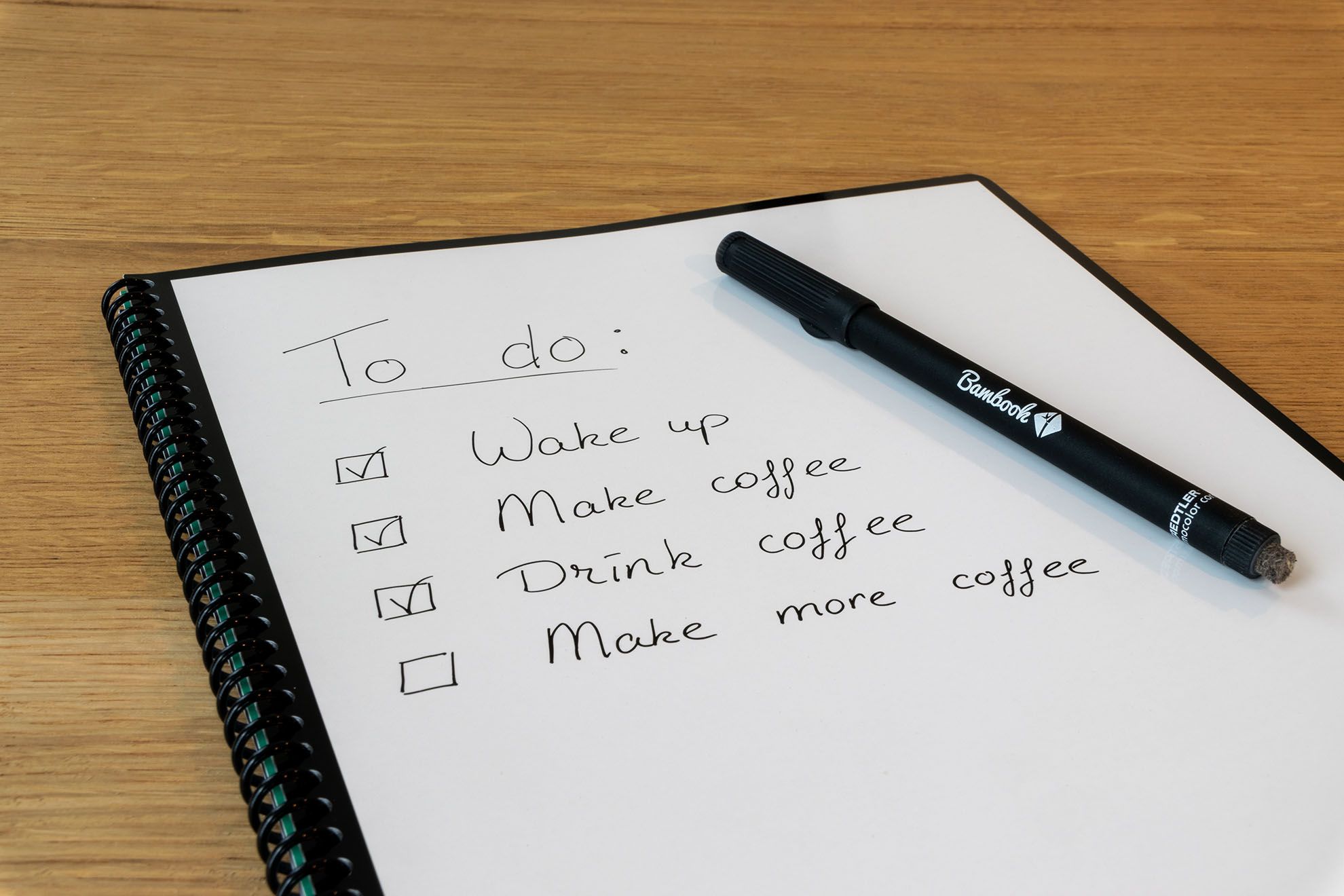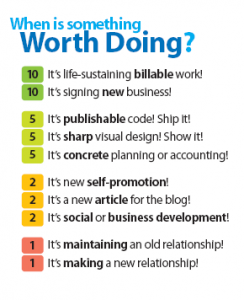7 Little-Known To-Do List Tricks to Increase Your Productivity

When I talk to my coaching clients about to do lists, the number 1 response, without a doubt is: "I don't need one. I have a very good memory. I remember everything." Well, good for you buddy, it's only that...
That the primary goal of the to-do list is not to remember a task, it is to make sure you really do it.
We don't write it down (only) for the sake of not forgetting anything. Its provides us with a guide, a timetable by which we organize our day or our project. Try doing that purely in your head and you will fail.
I think this is crucial, so I'd better write it again. The to-do listis not about memorisation. The to-do list is about organisation.
I say this for the reason that an estimated 90% of the people I've met, whether in training or in my personal life, don't regularly write any to do lists. "I remember everything. I have a good memory, so why would I write it down?"
"Something magical happens
when you put pen to paper."
The moment you put your goals and task down on paper, you've taken the first and perhaps most important step to completing them. You've created a contract with your self.
1. Write down your to-do list every day.
You know to-do lists work. All of us have created one at one point of our life. Usually, at the point when chaos overwhelms us, when we are totally stressed out, we put a blank piece of paper on the table in front of us and start thinking...
How shall I solve this problem? What should be the first step? And what will I do after?
We think about what we need to do and slowly put each task on the paper. In a few minutes we have the paper filled and we experience a sense of relief. Just by writing things down. Crazy, right?
Well actually, there is a very good reason for that. When our mind is overwhelmed, when we have to think about 100 things at once, it just stresses us and extremely lowers our performance. It's like opening a hundred tabs at once in Chrome :)
But when we take our tasks and thoughts outside of our head and put them down on paper, we are relieved. It works every time, right?
So when writing down your tasks to a to-do list, thinking on paper and carefully planning your days and projects, works every time, why is it that so many of us do it so rarely?
It beats me... I don't have an answer other than my favourite quote of the father of modern coaching, Sir Timothy Gallwey:
"People usually have the intellectual ability needed to do a good job. It just makes it difficult for them to act on what they already know. We don't need to learn more... We need to change the way we use what we already have in us." -- Timothy Gallwey
So yes, do the right thing and create your to do list every day. Whether it's every evening after work or every morning - that doesn't matter. Whatever works for you. But make sure to find out what works and then stick to it.
I know the "sticking" part might be not that easy, but hey, there is always an anti-procrastination section on my blog, that you can check out :)

2. Always make your tasks actionable & specific.
If the number 1 mistake when it comes to productivity is having no to-do list, then number 2 would not being specific enough. Way too often I see tasks like "Work on my thesis", "Marketing", or "Finish the project" when I look at the to-do lists of my clients.
- Be specific: You need to know exactly what the next step is. The tasks needs to be actionable. Organise your tasks by contexts. If you are writing your tasks on paper, use capital letters and use words like EMAIL, WRITE, TALK TO etc. as the first word of your tasks.
- Know the difference between a project and a task: According to the GTD methodology, but also according to common sense, it is a good idea to divide more complex tasks into several steps. For example, preparing a PowerPoint presentation is quite a complex process, but if you write down all the steps (create the outline, find the pictures and videos, choose a template, put it all together, rehearse...) all of a sudden it becomes way easier...
You can focus better when a project's tasks are all clearly laid out in writing. Concentrate on one particular action, step, or activity... You don't put things off till later and work efficiently since you know exactly what needs to be done right now. Breaking projects down into individual tasks makes it easier to take that first step. It enables us to move forward.
3. Mark the two most important tasks
As soon as you write your to-do list each night, look at it and ask yourself a question: "What two tasks do I really need to do tomorrow to be happy with myself?" In other words, which tasks on your to-do list are really important? If you only had time to do one single task, which one would it be? Start with that one.
If you're not sure, which task could be the most important, try to do it this way... Which task do you find most difficult? Which one do you really hate and want to put off for tomorrow? Put an exclamation point next to it and start tomorrow's day with that one. No Facebook, no Instagram, no checking emails...
Sit down at your desk and start working. And if you need an extra push to motivate yourself, give a try to Pomodoro technique with a little twist.

4. Think in hours, not days.
I believe that one of the reasons why people struggle to keep up is that we lack the skills to accurately predict how long a project will take given. Make it a habit to jot down brief notes next to each of your duties, such as "5 minutes," "30 minutes," "60 minutes," etc.
Work on your tasks from your to-do lists and when you're done with it, note how long it actually took you. In other words, keep track of how much time did you plan for a task vs. how much time did it actually take.
There are two possible scenarios:
- You work faster than you think: Often, we tend to overestimate how much time do we really need to finish something. Sometimes we say we need a month, when in reality we need one weekend. Chances are you might be surprised how fast can you actually move forward, once you realize you don't need a day to "Finish a presentation". You just need 15 mins to write the bullet points, 15 mins to find correct media and 30-60 mins to put it all together.
- You work slower thank you think: Do you know those people who tell you "Just 5 minutes" and then they keep you waiting for another hour? If that sounds like you, chances are it fits your work style as well. Continue giving a time estimate to each task you plan to work on as well as marking down the actual time it took.
Over time, you will learn to plan your time better because you will have a much better idea of how fast or slow you can complete all your tasks on your to-do list.

5. From the to-do list straight to the calendar
Povedzte mi... Aký je z hľadiska času rozdiel medzi úlohou a schôdzkou? Absolútne žiadny! Ak potrebujete ráno od 9:00 do 11:00 pripravovať prezentáciu pre klienta, 90% ľudí si to do svojho kalendára nezapíše. Títo istí ľudia ale dlhé roky a využívajú svoj kalendár na zapisovanie narodenín, meetingov, a najrôznejších pripomienok.
Kalendár by Vám mal slúžiť ako dokonalý prehľad o tom, ako trávite svoj čas. Ak ho trávite prácou, napíšte si to tam. Ak to urobíte, nemôže sa Vám stať, že nestihnete svoj deadline, pretože ste si naplánovali tri meetingy na dobu, keď ste práve mali dokončovať svoj dôležitý projekt.

6. Task Scoring instead of Priorities Setting
Want to push yourself to work on the crucial most important tasks? Get rid of the meaningless A, B, and C priorities... Using numbers rather than A, B, C priorities is much better method to motivate yourself, keep track of your productivity and improve your performance over time.
Think of it like this:
- Your most significant task is worth 10 points. It has to be something that push your project significantly forward. Let's say you close a sale - that's 10 points. Let's say you finish doing your taxes - 10 points for Gryffindor! The 10 point tasks on your to-do lists are those that have the biggest impact on you and your work.
- Tasks that are satisfactory but don't significantly advance your aim should be scored a 5.
- for routine tasks like sending an email, calling and setting up a meeting, etc., assign a 1 or a 2 - depending on how you feel about it.
At the end of the day, add up how many points you've achieved. That will be your baseline. Tomorrow, try to beat it. It's completely up to you whether you decided to write 20 emails (20 1-point tasks) or do a proper deep work for a few hours and finally cross-out the long avoided most important task on your to-do list.
